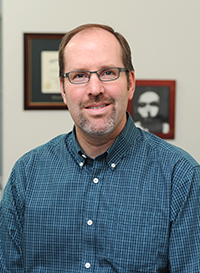Breadcrumb
The goal of the Interdisciplinary Reproduction & Health Group (IRHG) Seminar Series is to highlight transdisciplinary precision research taking place in the reproductive health field, provide opportunities for collaboration among researchers to build their own research efforts and promote clinical/researcher activity across the University of Missouri System and our partners.
The IRHG was organized and established through a faculty-driven, grass roots effort in 2016 to develop an integrative interdisciplinary program that transcends traditional departmental, college and system boundaries to foster excellence in reproduction, health research and education at Mizzou.
View all upcoming Reproductive Health events on the IRHG Seminar Series website.
For questions about this event, please reach out to Wipawee Winuthayanon.
Actions of PGRMC Proteins in Reproductive Physiology and Disease
Speaker: James Pru, Ph.D., Rochelle Chair, Department of Animal Science, University of Wyoming
Date: November 6, 2024, 4-5 p.m.
Location: Roy Blunt NextGen Precision Health Building, Atkins Family Seminar Room
In-person and virtual option
- Light snack will be provided in person. All are welcome!
- Attend virtually in Zoom with ID 969 5309 4849 and passcode 422673.
About the Speaker
 Our research focuses on understanding molecular events coordinating the physiology of embryo implantation using transgenic mice and domestic ruminants as model organisms, as well as human tissues. The long-term goal is to identify evolutionarily conserved mechanisms that, when gone awry, contribute to infertility during early gestation (i.e., recurrent pregnancy loss). Related to embryo implantation, we are specifically interested in the processes by which the embryo signals its presence using a unique molecular dialog as it invades the uterine wall in an effort to establish an exchange apparatus with the mother for nutrients and waste. As female sex steroid progesterone coordinates many aspects of embryo implantation, we are also interested in knowing how progesterone signals in the endometrium through non-classical mechanisms. We recently demonstrated the expression of novel membrane progestin receptors in the uterus, and ongoing studies are designed to test the functional importance of these putative receptors in female reproduction using conditional mutagenesis approaches. In related studies, efforts are being made to learn how resident stem/progenitor cells of the endometrium contribute to uterine regeneration during the estrous/menstrual cycle and following parturition. Our research findings contribute to a general understanding of the molecular underpinnings of reproduction in the female. They also offer an opportunity to develop therapeutic strategies to counter aberrant molecular events that contribute to infertility and to cultivate contraceptive applications.
Our research focuses on understanding molecular events coordinating the physiology of embryo implantation using transgenic mice and domestic ruminants as model organisms, as well as human tissues. The long-term goal is to identify evolutionarily conserved mechanisms that, when gone awry, contribute to infertility during early gestation (i.e., recurrent pregnancy loss). Related to embryo implantation, we are specifically interested in the processes by which the embryo signals its presence using a unique molecular dialog as it invades the uterine wall in an effort to establish an exchange apparatus with the mother for nutrients and waste. As female sex steroid progesterone coordinates many aspects of embryo implantation, we are also interested in knowing how progesterone signals in the endometrium through non-classical mechanisms. We recently demonstrated the expression of novel membrane progestin receptors in the uterus, and ongoing studies are designed to test the functional importance of these putative receptors in female reproduction using conditional mutagenesis approaches. In related studies, efforts are being made to learn how resident stem/progenitor cells of the endometrium contribute to uterine regeneration during the estrous/menstrual cycle and following parturition. Our research findings contribute to a general understanding of the molecular underpinnings of reproduction in the female. They also offer an opportunity to develop therapeutic strategies to counter aberrant molecular events that contribute to infertility and to cultivate contraceptive applications.